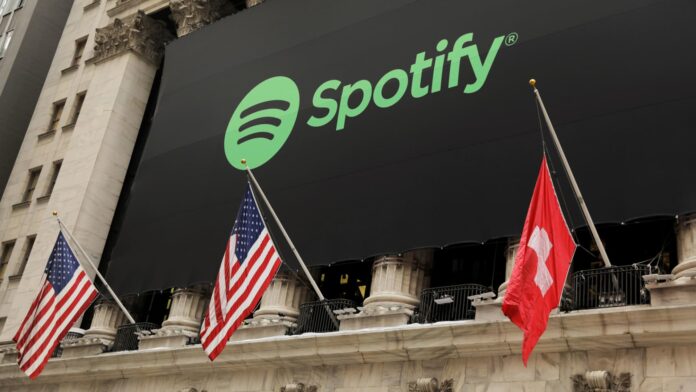Spotify does not deserve the same treatment as other streaming companies, according to a growing number of people on Wall Street. “I think that is the most interesting name that people have completely written off,” LightShed Partners’ Rich Greenfield said last week on CNBC’s ” Squawk Box .” Shares of the streaming company are down roughly 50% this year, as investors, mindful of an era of rising interest rates, dumped shares of tech stocks and other growth names. Audio leader Still, some investors say that Spotify should not be tarred with the same brush as Netflix or other streaming companies that have cratered this year because of weak user numbers. These proponents say Spotify has cornered the market on music worldwide, and could capture more of the total audio market as it expands into podcasts and audiobooks. “They have very little competition. They dominate the category,” Greenfield said. “Yes, it’s a low base, but they are certainly growing faster than peers.” Those rivals include well-heeled competitors such as Apple, Amazon and Google-parent Alphabet, all of whom have made forays into streaming music and podcasts, and could leverage their businesses to claim more market share. Nevertheless, Spotify has maintained its leading position. Last week, the streaming company beat revenue expectations in its second quarter earnings , and reported that it added 433 million monthly active users, which is 19% higher year-over-year, and 5 million above guidance. Meanwhile, paid subscriber growth expanded by 14% year-over-year to 188 million. Shares surged following the quarterly earnings report. “While the macro environment continues to present uncertainty, we’re currently not seeing any material impact on our expectations for user or subs growth from the economic downturn, Spotify CEO Daniel Ek said on the most recent earnings call. “In fact we’re seeing several markets trending ahead of our forecasts.” “We’re confident in our ambitions to get to 1 billion users by 2030, while at the same time we are also focused on improving our gross margins and continuing to generate positive free cash flow,” he added. Morgan Stanley analysts expect that Spotify can sustain a greater than 30% market share in streaming over time, according to a recent note. “They’re the leader in that global TAM,” said Evercore ISI’s Mark Mahaney, referring to the total addressable market. “We’ve run survey work on Spotify for years, and they are the leading player on both Android and Apple devices. So, there are more people who subscribe to music or join music on Apple phones using Spotify than actually Apple Music.” Meaningful margin expansion To be sure, other investors are critical of Spotify, questioning whether the business can ever achieve durable profits , especially as recession concerns loom and interest rates rise. “While we believe there remains material user growth left for Spotify we highlight that many investors question whether Spotify will ever be able to generate significant lasting profitability,” wrote Pivotal’s Jeffrey Wlodarczak in a July 28 note. The analyst has a hold rating on the stock. The streaming company has to deal with powerful music labels that could renegotiate deals and limit gains in Spotify’s profits, according to Pivotal. Nine out of 10 songs streamed on Spotify are owned by just four music companies, the report said. At the same time, since it went public in a direct listing in 2018, Spotify has failed to expand its low gross margins, even as its revenue base has doubled, according to Evercore ISI’s Mahaney. Gross margins for the company declined to 24.5% in the three-month period ending in June, down from 24.9% in the first quarter of 2022. They previously reached an all-time high of 28.1% in the second quarter of 2021. Still, at Spotify’s June Investor Day, CEO Ek noted that gross margins from music are “steadily climbing,” even as they’re dragged down by the company’s podcast investments. Since its public debut, Spotify has gone on a spending spree, snapping up podcasting networks such as Gimlet Media, as well as the rights to stream Joe Rogan’s podcast. “There’s two possible explanations for this lower gross margin result,” Ek said at the event, according to a FactSet transcript. “One might be that Spotify just isn’t that good of a business. And the other is that we’re investing behind the strength of our business to make the business bigger, stronger and more resilient; and I will share with you today that the music business is doing much better than you think.” For Evercore ISI’s Mahaney, this means that there’s a “gross margin inflection point” coming for Spotify, as the company starts to pull back on podcast investments, and as it continues to achieve scale in its advertising revenue business. “If that’s true, then gross margin should expand next year,” said Mahaney.
© heardonwallstreet.com


